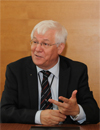 |
||
|
Japanese Security Council Approves Export of Sensors for US Missile Systems – Reports RIA Novosti, PUBLISHED 18.07.2014 Japan’s National Security Council approved the export of high-performance sensors produced by Mitsubishi Heavy Industries to the United States, making it the first arms export since Tokyo lifted its self-imposed ban on such materials in April, Kyodo news agency reported Wednesday. The high-performance sensors will be installed on the PAC-2 surface-to-air missile (SAM) systems, intended for further export to Qatar. The Japanese company has been producing high-performance sensors for the PAC-2 system under a respective license from US defense contractor Raytheon. The restrictions are as follows: exports of weapons to countries participating in international conflicts are prohibited; if the respective arrangement poses a threat to the security of Japan; if the exported goods are used in ways other than the ones specified in the contract purposes or fall under unauthorized transfer to third countries. These conditions allow the Japanese manufacturers to export weapons and actively participate in the international arms market. Other news: Russia May Sign Agreement to Build 8 Reactors in Iran A source close to the negotiations told journalists Thursday. Hungary Enacts Law to Expand Nuclear Power With Russian Aid Hungary’s president has signed a bill into law to expand a nuclear power plant in the country with Russian assistance. Hungary Lawmakers OK Russia Nuclear Plant Deal Russia will provide Hungary a loan of up to 10 billion euros ($13.5 billion) - around 80 percent of construction costs. Last news:
|
Hero of the day 
We are currently working with the Nuclear Decommissioning Authority (NDA) on this approach, which was submitted in response to their February 2012 call for alternative proposals. We appreciate that the UK is in the early stages of their policy development activities and are pleased to be involved in such important work. INTERVIEW
Yanko Yanev OPINION
Joint Plan of Action |
Licence Р В Р’ВВВР В Р’В» №ФС77-30792. ATOMINFO™ trademark.

